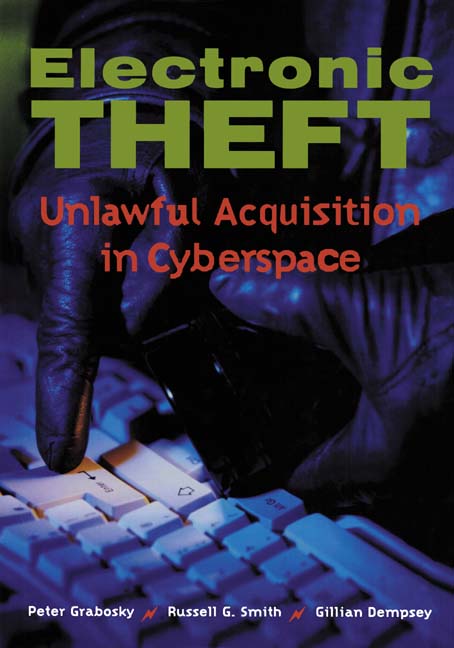Freshly Printed - allow 8 days lead
Couldn't load pickup availability
Electronic Theft
Unlawful Acquisition in Cyberspace
Electronic Theft names, describes and analyses the range of electronic and digital theft.
Peter Grabosky (Author), Russell G. Smith (Author), Gillian Dempsey (Author)
9780521805971, Cambridge University Press
Hardback, published 2 April 2001
246 pages
24.4 x 17 x 1.6 cm, 0.6 kg
Review of the hardback: '… an excellent read for those who want to get a general understanding of theft in the communication age … I would recommend this book to anyone interested in how the study of criminology has been accommodated to new digital technologies.' International Journal of Law and Information Technology
When this book was first published in 2001, the convergence of communications and computing had begun to transform Western industrial societies. Increasing connectivity was accompanied by unprecedented opportunities for crimes of acquisition. The fundamental principle of criminology is that crime follows opportunity, and opportunities for theft abound in the digital age. Electronic Theft named, described and analysed the range of electronic and digital theft, and constituted the first major survey of the field. The authors covered a broad list of electronic misdemeanours, including extortion, defrauding governments, telephone fraud, securities fraud, deceptive advertising and other business practices, industrial espionage, intellectual property crimes, and the misappropriation and unauthorised use of personal information. They were able to capture impressively large amounts of data internationally from both scholarly and professional sources. The book posed and attempted to answer some of the pressing questions to do with national sovereignty and enforceability of laws in 2001.
Preface
Abbreviations
1. Theft and cyberspace
2. Stealing funds electronically
3. Digital extortion
4. Defrauding governments electronically
5. Telephone fraud and theft of internet services
6. Online securities fraud
7. Electronic 'snake oil': deceptive and misleading online advertising and business practices
8. Intellectual property in cyberspace
9. Industrial espionage in the digital age
10. The electronic misappropriation and dissemination of personal information
11. The limits of the law in controlling electronic theft
References
Index.
Subject Areas: Internet guides & online services [UDB], International law of transport, communications & commerce [LBD], International economic & trade law [LBBM], Crime & criminology [JKV]


